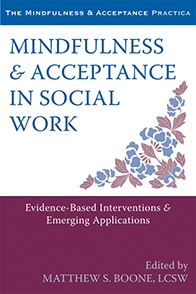 Mindfulness and Acceptance in Social Work: Evidence-Based Interventions and Emerging Applications is a thorough primer for mental health practitioners interested in adopting a more holistic approach to serving their clients while increasing their own self-awareness and growth across the life span. The editor has compiled and coauthored thoughtful essays on a variety of modalities, from behavioral activation to acceptance and commitment therapy, dialectical behavioral therapy to mindfulness-based stress reduction. The evidence-based interventions and emerging applications address the ongoing development of cultural competence, best practices for at-risk children’s groups, and self-regulatory practices that enhance one’s healing presence. Social workers, counselors and therapists who have searched for a deeply humanistic way to apply cognitive interventions will find inspiration in these pages.
Mindfulness and Acceptance in Social Work: Evidence-Based Interventions and Emerging Applications is a thorough primer for mental health practitioners interested in adopting a more holistic approach to serving their clients while increasing their own self-awareness and growth across the life span. The editor has compiled and coauthored thoughtful essays on a variety of modalities, from behavioral activation to acceptance and commitment therapy, dialectical behavioral therapy to mindfulness-based stress reduction. The evidence-based interventions and emerging applications address the ongoing development of cultural competence, best practices for at-risk children’s groups, and self-regulatory practices that enhance one’s healing presence. Social workers, counselors and therapists who have searched for a deeply humanistic way to apply cognitive interventions will find inspiration in these pages.
Of particular interest to the more spiritually oriented reader will be the exploration of Zen roots in mindfulness practices and how functional contextualism takes on deeper meaning when we consider our shared interdependence. Expanding on our understanding of person-in-environment, an Eastern framework for person-as-environment bridges modern social work with ancient practices for the reduction of suffering, both in oneself and others. Those invested in working toward global well-being will be reignited with encouragement for the ways in which one individual’s healing and expanding realizations can spark necessary changes at the micro, mezzo and macro levels.
The variety of approaches reviewed helpfully represents the “technical eclecticism” required to effectively serve a broad array of clients from a mindfulness perspective, while allowing humanistic practitioners to stay firmly rooted in their theoretical center. The modalities discussed integrate differing levels of emphasis on thought, feeling and behavior, giving the practitioner beginning assessment and treatment tools to adjust for clients’ more evident processing pathways and efforts at wellness. Those who need more concrete structure are likely to respond to behavioral activation or dialectical behavioral therapy, while those who benefit more from insight-oriented, moment-to-moment self-regulation practices may respond more to acceptance and commitment therapy, or mindfulness-based stress reduction.
Since Mindfulness and Acceptance in Social Work is a primer, it does not address the amount of time and training that are necessary to become proficient in facilitating any of these approaches with any given population or clinical concern. Mental health practitioners committed to ethical practice would be wise to seek out training and supervision to develop adequate skills to serve a broad spectrum of clients, and particularly those with the most need. This primer focuses primarily on the needs of individual young to middle-aged adult clients, rather than families, couples, children, the elderly or many types of groups; practitioners serving multiple clients together, or clients not of middle adulthood, may wish to further research articles addressing their client populations and the best use of mindfulness practices for them. Knowing how to apply mindfulness and acceptance in crisis management requires further training and supervision.
Professional counselors who work in community-based agencies, public health clinics, field-based settings and private practices may all find a thread to follow from Mindfulness and Acceptance in Social Work: Evidence-Based Interventions and Emerging Applications. The authors have written from each of these work experiences, addressing respectful integration of the mindfulness tradition into their modern social work. Given the movement that mindfulness has seen in these managed care settings, there is likely to be increasing evidence for its application with a wider variety of clients across the life span and from around the world in the coming years. For the counselors who wish to be a part of that movement, Mindfulness and Acceptance in Social Work: Evidence-Based Interventions and Emerging Applications is a well-written springboard from which to launch.
Boone, M. S. (Ed.). (2014). Mindfulness and acceptance in social work: Evidence-Based interventions and emerging applications. Oakland, CA: New Harbinger.
Reviewed by: Karen Roller, Palo Alto University, Palo Alto, CA.
The Professional Counselor
